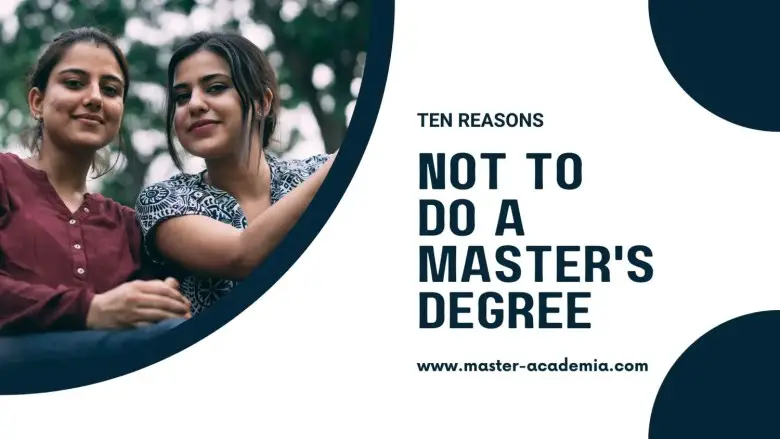
One decision before becoming a master’s student should not be disregarded: whether or not to do a master’s degree. There are good reasons to earn a master’s degree, for instance right after graduation. Yet, doing a master’s degree may not always be the best option. The following ten reasons explain why.
Contents
- 1. You are leaning toward doing a master’s degree because it is expected of you
- 2. You only want to do a master’s degree because everyone else is doing one
- 3. You don’t actually know what you want to study for a master’s degree
- 4. You think an advanced degree guarantees a better position on the labour market
- 5. You are actually not that interested in learning something new right now
- 6. You are too lazy or too scared to interview for jobs
- 7. Your financial situation does currently not allow for it
- 8. You just want to do a master’s degree to spend some time abroad
- 9. You are afraid that now is your only chance to earn a master’s degree
- 10. Your gut tells you that doing a master’s degree is the wrong decision right now
1. You are leaning toward doing a master’s degree because it is expected of you
Following a master’s degree programme full-time is usually a one or two-year commitment. One or two years of your life! It is a long time.
So, think carefully about this commitment. Ask yourself why you want to do a master’s degree. Simply doing a master’s degree because it is expected from you (for instance by family) is not a good idea.
Successful master’s students are those that are intrinsically motivated. If you only do a master’s degree because you feel social pressure, you are in for a tough time.
2. You only want to do a master’s degree because everyone else is doing one
Similar to social pressure, for instance from family, peer pressure should not be a factor in your decision on whether to do a master’s degree or not.
Everyone else in your friends group is doing a master’s? Good for them. It does not mean that this is the right decision for you.
If you are contemplating a master’s degree, you are at a stage in your life when you should make strategic decisions. You should be able to critically reflect on your life and your choices. You do you.
You may also like: Ten reasons NOT to pursue an academic career
3. You don’t actually know what you want to study for a master’s degree
Do you have a clear idea what you want to study at a master’s level? Great, go for it! However, if you are doubting what to study, it could be smarter to postpone doing a master’s degree.
Following a master’s degree programme is time-intensive and can be expensive. There is no point in spending valuable resources – above all time and money – if you don’t actually know what you want to study.
Doing an internship, traineeship, or getting a job is usually the better strategy to figure out what you are interested in, and what you want. Plus, you gain valuable work experience. You can always do a master’s degree when you have a clearer target.
4. You think an advanced degree guarantees a better position on the labour market
For some professions, having a master’s degree can be an advantage on the labour market. However, this cannot be generalised.
On the contrary, employers increasingly value work experience over yet another degree or diploma. Thus, just assuming that a master’s degree guarantees you better job prospects is counterproductive.
When following a full-time programme, you lose one or two years of full-time work experience (including a full-time salary). And once you graduate, someone with a bachelor’s degree and more work experience may still secure the job that you apply for.
5. You are actually not that interested in learning something new right now
Successful master’s students are curious, critical thinkers. They ask many questions to retrieve new information and enhance their learning.
If you are not that interested in learning something new right now, that’s okay. But it also means that you should probably stay away from a master’s degree programme right now.
There are probably better ways to spend your time.
6. You are too lazy or too scared to interview for jobs
Entering the labour market, putting yourself out there, sending out applications and interviewing for jobs can be scary! And it is very time-intensive.
Some master’s students choose to follow a programme out of convenience. Especially if they just earned a bachelor’s degree, continuing with a master’s seems like an easier choice. After all, they are familiar with the university system and roughly know what to expect.
Do you sense that either fear or laziness draw you to a master’s degree? Put a stop to it! These are very bad reasons to do a master’s degree. Give yourself a push. Look for help, like application and interview coaching. You are a grown up, and you can do it!
7. Your financial situation does currently not allow for it
Not only do most master’s degree programmes have tuition fees, but the time spent studying cannot be used to earn money elsewhere. Be cautious about going into debt just to earn a master’s degree!
Critically assess your financial situation and be honest with yourself. Maybe your financial situation currently does not allow for a master’s degree. Maybe it is smarter to wait a few years or to make use of an employer-sponsored degree at some point in your career.
If you really want to do a master’s degree, try to apply for scholarships and grants. And explore options in countries with lower or no tuition fees.
8. You just want to do a master’s degree to spend some time abroad
Master’s degree programmes can be attractive if they offer a semester abroad, and you like to travel and live in a different country for a while.
Is this one of the many reasons that draw you to a master’s degree programme? Great, go ahead! If it is the only reason, think again!
There are so many other options to spend time abroad that do not involve a master’s degree. There is, of course, regular travelling. But also think about volunteering or an internship abroad. Or securing a job that allows you to spend time in different countries as part of your role.
9. You are afraid that now is your only chance to earn a master’s degree
If not now, will there ever be another opportunity to do a master’s degree? The simple answer is: yes. And it may be an even better one.
Many graduating bachelor’s students assume that a master’s degree has to be done when they are in their early or mid-twenties. This is far from true. You can do a master’s degree at any age.
In fact, by simply waiting for a while, better opportunities for doing a master’s degree may arise. For instance, some employers sponsor master’s degrees for their employees. This means they cover the tuition fee, and allow employees to spend part of their working hours on studying. Now that is a sweet deal!
10. Your gut tells you that doing a master’s degree is the wrong decision right now
Sometimes, we have to trust our feelings. If your gut tells you that doing a master’s degree is not the best decision for you right now, listen to it.
Of course, it can be useful to explore deeper why you are feeling this way. Some of the reasons not to do a master’s degree listed here can help with that process.
In the end, however, it comes down to this: Life is short. You only live once. So do what feels good. And that may not be a master’s degree (right now).



